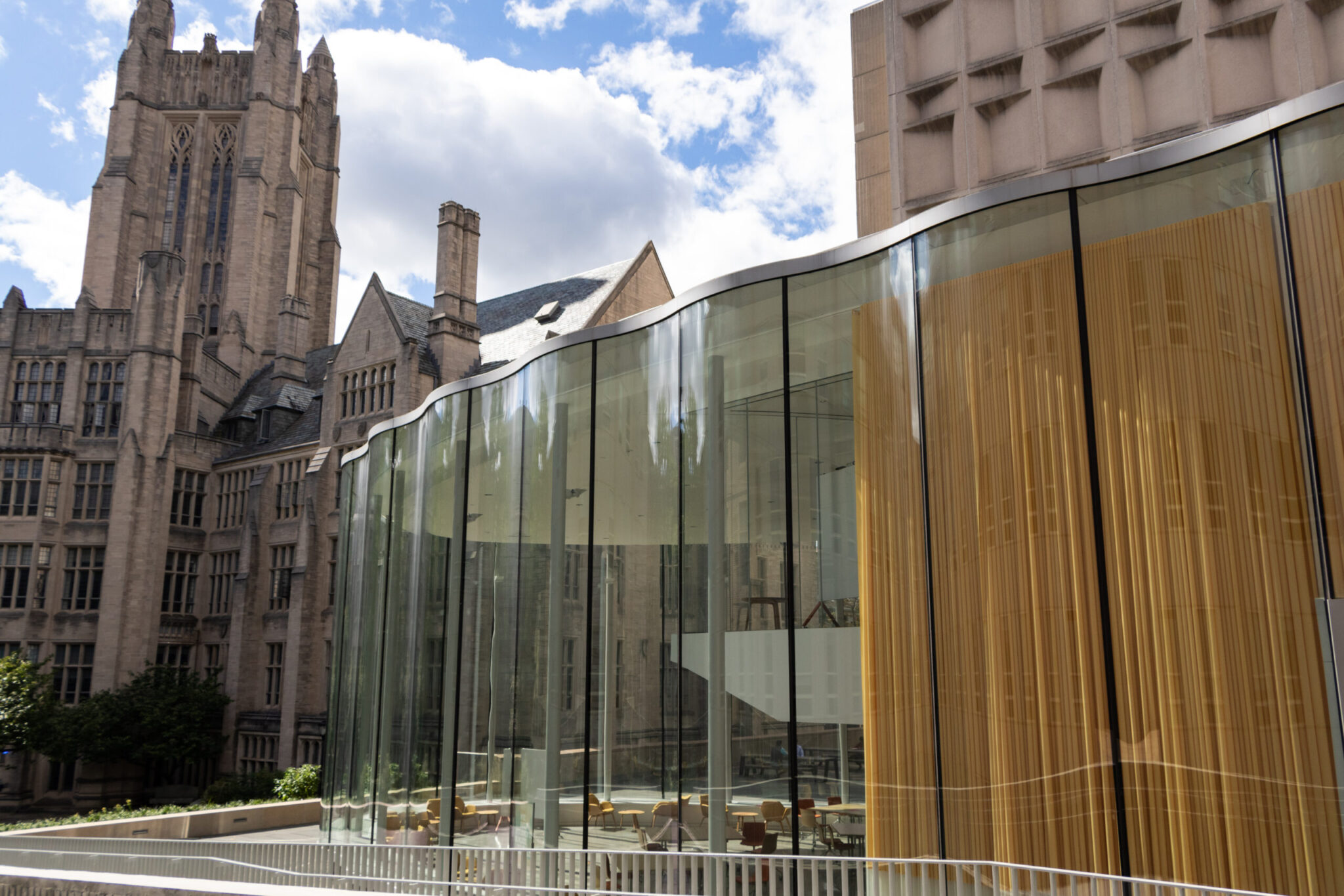Desmos founder talks graphing calculators, charting his career
Eli Luberoff ’09 discusses his educational journey and inspiration for Desmos with current Yale College students.

Zoe Berg, Senior Photographer
Dozens of students gathered to hear Eli Luberoff ’09, the founder of Desmos, give a talk at the Tsai Center for Innovative Thinking on Saturday.
At the event, Luberoff discussed his educational path before attending Yale and how his college experiences shaped his interest in starting Desmos, a free web-based graphing calculator application. At the time, Luberoff felt that expensive graphing calculators were making mathematics education inaccessible to many students.
With his multifaceted educational background, Luberoff sought to create a tool that reduced barriers to mathematics instruction.
“It started as an experiment to see if a graphing calculator can work on a browser,” Luberoff said. “I also wanted to reduce inequities and make public education better.”
Luberoff initially described his complicated education route. When he was young, he never stayed in the same educational institution for more than two and a half years. After having one particularly antagonistic teacher, Luberoff’s family placed him in the education system in Amherst, Massachusetts.
A curious kid, Luberoff described how he left his middle school to take classes at the University of Massachusetts Amherst, where he was first introduced to higher-level math and physics.
“I dropped out of middle school because I wanted to try college,” Luberoff said.
After attending classes at both his local high school and college, Luberoff enrolled at Yale. However, his Yale journey did not come without challenges. After two and a half years, Luberoff felt burned out and withdrew from college. After support from his mother, Luberoff eventually returned to Yale and completed his degree in Mathematics and Physics.
Even with his tumultuous educational history, Luberoff emphasized that he does not think that education is broken.
“I don’t agree with the idea that education is all broken and that we should flip it on its head, privatize it all and figure out a way to customize it to individual students,” Luberoff said. “I very much have the opposite approach. I think that an incredible part of a well-functioning society is the education system. How can I try to make it better?”
Before founding Desmos, Luberoff created Tutor Trove, a tutoring software company that developed various tutoring tools.
However, Luberoff found himself spending much of his spare time on creating a graphing calculator tool, which eventually became Desmos.
“I found that the only part of Tutor Trove that really impacted my students’ understanding was the graphs with the sliders that helped them visualize what they were learning,” Luberoff said.
In 2011, Luberoff launched Desmos at TechCrunch Disrupt NYC. Luberoff discussed how he was disappointed at how many people focused on its technological mechanisms rather than educational functions. He said that he later found educational conferences to be much more useful, as he learns how best to serve educators and students.
For example, Luberoff cited that users have long requested an interactive three-dimensional graph, Desmos’s most recent innovation. For him, the company’s commitment to education has allowed Desmos to continue being an accessible educational platform.
Emilie Ma ’25, who interviewed Luberoff at the event, first met him at a 2009 alumni reunions event. She felt that his efforts to improve Desmos were evident.
“He came up to us and asked us if anyone knew what Desmos was and if any of us have areas of suggestion and improvement,” Ma said. “I was super excited because I love start-ups and entrepreneurship.”
Still, Luberoff also recognizes the need for top-down approaches to change education for everyone. Desmos has been working with the College Board for the last six years to designate the software as a permitted tool on standardized tests. Luberoff noted that now, after gaining popularity among teachers and students, Desmos is the official calculator on the SAT.
Kelvin Yip ’24, an organizer of the event, appreciated Luberoff’s candor when discussing the difficulties in creating a start-up.
“It is really amazing to hear from a Yale alum who has done it before,” Yip said. “He made me realize that I want to jump into start-ups for tools that people would be able to use.”
Even with Desmos’s increasing presence in everyday learning, Luberoff recognized that overreliance on technology in the classroom can be dangerous.
Every piece of technology, Luberoff said, has a time and a place.
“If you understand how to graph a parabola on your own, then using Desmos is an asset and not a cost,” Luberoff said. “But if you use us too early, it would prevent someone from learning.”
The name Desmos emerged from a naming contest he had with his friends and family, Luberoff explained.
When asked whether Desmos was named after the Yale senior society, Desmos — which is responsible for organizing the month-long, senior-only series of social events known as “Feb Club” — Luberoff emphatically said no.
“Hell no,” he said, “[the society] was a bit defunct while I was here.”
Today, 75 million people use Desmos, which means “to bond” in Greek.







